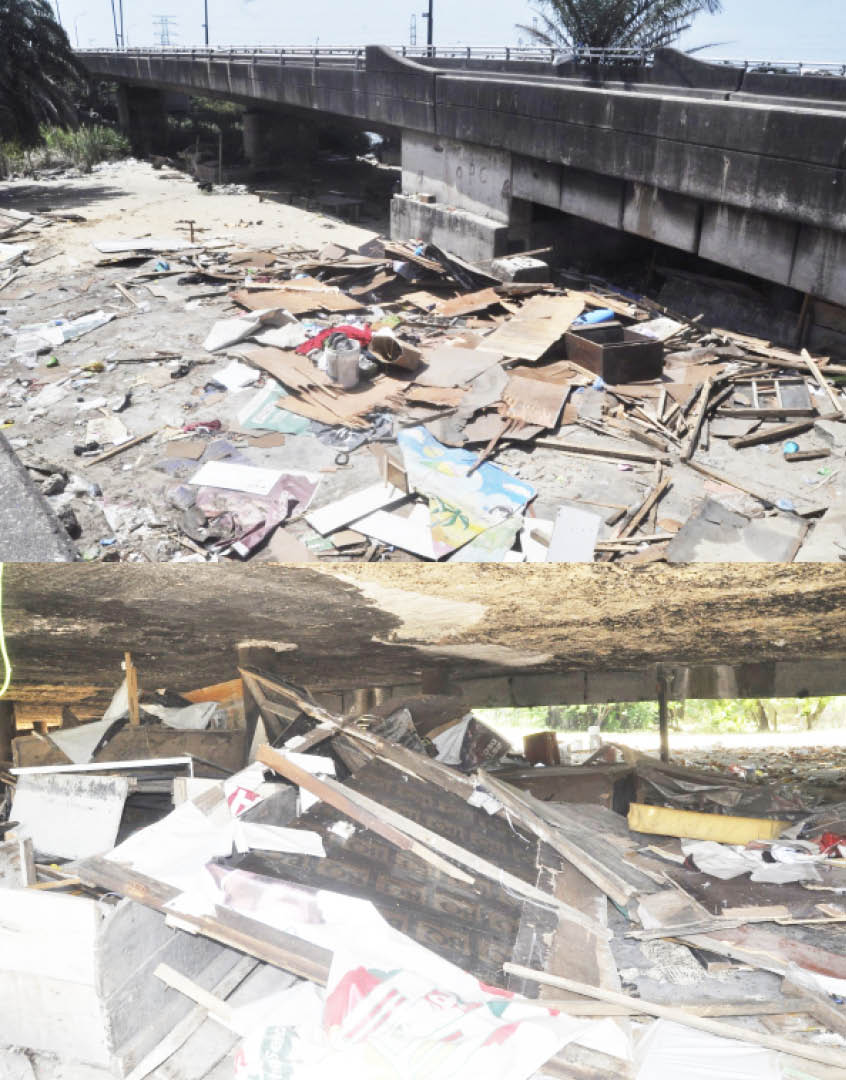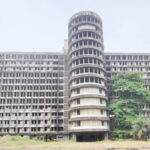Squatters at Dolphin Estate in Lagos are trying to adjust to the reality of their displacement after the state government chased them away from their “abode” and cleared the shanties where they lived. Some of the affected “residents” narrated their ordeals to Daily Trust on Sunday.
The Dolphin Estate bridge was deserted on Thursday when one of our correspondents visited. A once bustling and busy slum has been turned to a ghost of itself, adding to the increasing number of displaced Lagosians battling the challenges of homelessness.
During the week, the Lagos State Government blew a cover of 86 apartments under the Dolphin Estate bridge, Ikoyi, where tenants reportedly paid N250,000 annual rent.
The state’s Commissioner for Environment and Water Resources, Tokunbo Wahab, disclosed this in a video post via his X account on Wednesday.
- How housewife died protecting son in Edo
- The cost of coastal highway project on businesses, lives in Lagos
Wahab revealed that the 86 partitioned rooms, sized “10×10 and 12×10” were discovered in the slum.
He added that the enforcement team of Lagos State’s Ministry of Environment and Water Resources had successfully removed all structures, including a container utilised for various illegal activities, from beneath the Dolphin Estate bridge.
Sharing videos, the commissioner wrote, “18 individuals squatting illegally under the bridge leading from Dolphin Estate were arrested yesterday, April 30, 2024 by the officials from the Lagos State Environmental Sanitation Corps, also known as KAI (Kick Against Indiscipline).
“A total number of 86 rooms, partitioned into 10×10 and 12×10, and a container used for different illegal activities were discovered under the Dolphin Estate bridge.
“They have all been removed by the enforcement team of the Lagos State Ministry of the Environment and Water Resources.”
A special adviser to Governor Babajide Sanwo-Olu, Kunle Rotimi-Akodu, further confirmed the eviction of illegal settlers under the bridge towards Dolphin Estate in Ikoyi.
Rotimi-Akodu said 23 individuals were arrested during the eviction, which was carried out by officials of the Lagos State Environmental Sanitation Corps, popularly known as KAI on Tuesday.
And 24 hours later, the government said it discovered another illegal settlement under the Osborne bridge in the Ikoyi area of the state.
Wahab, on his X handle on Thursday, stated that the Lagos State Environmental Sanitation Corps (LAGESC), popularly known as Kick Against Indiscipline), had begun an immediate clearance operation.
“Another illegal settlement was discovered under the Osborne bridge, Ikoyi. Lagos State Environmental Sanitation Corps @LAGESCOfficial commenced an immediate clearance operation,” he tweeted.
Tale of woes
Our correspondents visited the Dolphin Estate bridge, Ikoyi and spoke to some of the displaced squatters.
Usman Hassan, a 75-year-old Ghanaian, was one of them. He was a teacher at Remo Divisional High, Ogun State before relocating to Lagos.
Also known as Baba Baraka, the Ghanaian said he was not around during the ‘attack’ by the Lagos officials and he lost some of his belongings to the onslaught.
Telling the story behind the apartment, he told Daily Trust on Sunday that, “The man who owned the place doesn’t force people, the engineers working in this company (referring to a company around) begged him for their workers to stay nearby so that when they needed them for work they would go to the place.
“I don’t know exactly how much he collects from them, but personally, he didn’t collect anything from me.
“For people paying, whether it is N250,000 or not, I don’t know.”
He explained that people found solace in the under-bridge apartments because “town is hard and they could not afford rent within Lagos.”
Hassan said, “You see, conditions are hard for people in the country and not everyone can afford houses in the town.
“I have been in this country since 1981 in Ogun State. I was a teacher at Remo Divisional High School for about 11 years before I came to Lagos.
“No work in town to survive on. This man pitied my condition and gave me space here (under the bridge). So, when this thing happened, I took my belongings and I am going again.”
Asked what is the hope for the future, he responded, “Well, everything is in the hand of God. Sleeping under the bridge is dangerous, but the condition of the country made people resort to this.
“As you can see, I don’t have a dime in my pocket.”
Also, Usena, a 12-year-old girl from Kogi State, said her elder sister brought her from the village. On how much residents there paid as rent, she said, “She is paying, but I don’t know the amount.
“I don’t really enjoy the place. I want a new house where I can stay with my parents in peace and enjoy ourselves.
“We had to stay under this bridge with my sister so we could raise money for a new house. My elder sister, who works in a supermarket, has been staying here for the past 20 years.”
Saheed Yusuf, a farmer, admitted that he paid an initial N40,000 and subsequently N20,000 quarterly to stay in the apartment.
“I have been staying there for about four years.
“Not all of us are paying. When I first got here, I paid N40,000, and after that, I started paying N20,000 quarterly. I have been here for four years.
“I am a farmer. I plant bananas around here. If you get to the other side you will see the plantation and vegetables I planted. I stayed here to be close to the farm.”
Also, Madam Eunice Johnson, who works at LAWMA, said she was not paying anything.
The latest displacement is just one out of the long list of displacements in the state as many people find it extremely hard to get decent accommodation in the city centre owing to the exorbitant prices of rent.
From Otodo Gbame, Oworonshoki to other places, the state government said there was the need to sanitise the environment and maintain the urban master plan of the state. But observers said this had only added to the woes of homelessness in the state in the absence of a social housing policy that caters for the poor of the poorest.
Several reports estimate that the housing deficit in Lagos sits at over 3 million and the available houses are out of the reach of the low-income and middle income earners, forcing many Lagosians to adopt unconventional approaches to solving the accommodation challenge under various bridges. The government had earlier cleared squatters under Obalende bridge and more people are in awe of the impending displacement.
Deji Akinpelu, co-founder, Rethinking Cities, whose organisation has raised concerns severally over the ongoing displacement in Lagos, insisted that the absence of a social housing policy had worsened the plight of the poor people in Lagos.
According to him, it is easier to dislodge the squatters, but a comprehensive strategy to bridge the housing deficit should be adopted.
Speaking with Daily Trust on Sunday, Akinpelu said, “As a government, you need to understand that there is a situation called homelessness, and homelessness is not a crime. There is homelessness all over the world and every responsible government has a policy about homelessness.”
According to him, the government must be able to leverage on partnership with non-governmental organisation, the private sector to tackle homelessness for the people.
“What is shocking for me is the fact that the government went on site and found out that some people are paying N250k per annum. What does that say to you as a government if you are trying to investigate who is collecting the money? It is not about who is collecting the money that is a problem, it is the fact that these people have a minimum of N20,000 per month to be paying for housing. That means there is a structure for housing that can be created for these people to be finding their level within a N20,000 home rental.
“It doesn’t take any intelligence to do what the commissioner is doing – going to chase them out of those places. The real hard work is when you build homes, not LAGHOMS but special structures to address the issue of homelessness across different local governments through partnerships. There is funding, there are opportunities to address the issue of homelessness. There is a design that is available. You build the homes and move the people into the homes and profile them—‘Where are you from? What do you do? Where do you work? And so on. There is no data on this.”
He said it was regrettable that people are living under the bridge when there are infrastructures that are not occupied. “People are homeless and you have empty state infrastructure and there is no plan,” he added.
He also dismissed the claim of arrest of the squatters, saying that is tantamount to criminalising homelessness, even as he added that environmental management should not be addressed from the prism of law alone.
“I don’t understand it. Is it that becoming homeless now is illegal? Environment is not just based on law, it is about understanding the city. I think the commissioner needs advisers who are urban planners to also help because he only sees things from an illegality perspective. He doesn’t see it from a town planning perspective or a responsive government.”

 Join Daily Trust WhatsApp Community For Quick Access To News and Happenings Around You.
Join Daily Trust WhatsApp Community For Quick Access To News and Happenings Around You.


